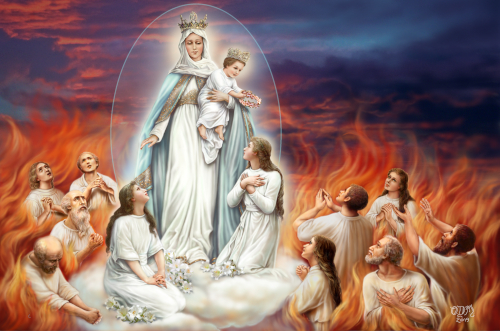Lives of the Saints
Our Models and Protectors
Spiritual Bouquet:
November 2 (The 3rd if the 2nd is a Sunday)

O.D.M. pinxit
Commemoration of
the Faithful Departed
All Souls Day
The Church teaches us that the souls of the just who have left this world with traces of venial sin remain for a time in a place of expiation, where they suffer whatever punishment may be due to their offenses. Even if pardon has been obtained for our sins, satisfaction must be made to God, our Creator, in this world or in the next; for His sanctity has been, as it were, insulted by the self-will of one of His ignoble creatures. The more noble the person offended, the more serious the offense, even according to human laws. It is a dogma of our faith that the suffering souls are relieved by the intercession of the Saints in heaven and by the prayers of the faithful upon earth. To pray for the dead is therefore an act of charity and of piety, certainly obligatory for a Christian who professes to have charity in his heart. We read in Holy Scripture: It is a holy and wholesome thought to pray for the dead, that they may be loosed from their sins. (II Maccabees 12:46)
When towards the close of the tenth century, Our Lord inspired Saint Odilon, Abbot of Cluny, to establish in his Benedictine Order a general commemoration of all the faithful departed, the practice was soon afterwards adopted by the entire Western Church and has been continued unceasingly to our day. Let us always bear in mind the departed who have died in the love of God, and offer up our prayers and sacrifices to help expiate for them. By showing this mercy to the suffering souls in purgatory, we gain for ourselves very devoted friends, who will in their turn pray for us. We shall then be entitled to be treated with mercy at our departure from this world, and to share more abundantly in the suffrages of the Church, continually offered for all who have fallen asleep in Christ.
Reflection: When we offer satisfaction to God in this life for our offenses, there is merit attached to our penances. There is no longer any merit in purgatory; others must provide. Let us reflect well that if we do not ourselves repair our sins and faults, we place our burden on others; is that what we want?
Little Pictorial Lives of the Saints, a compilation based on Butler's Lives of the Saints and other sources by John Gilmary Shea (Benziger Brothers: New York, 1894).